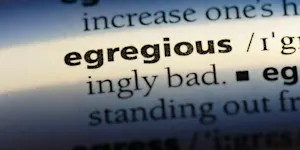What Makes This Word Tick
"Exonerate" is a word that brings a sense of relief. It's the golden ticket of words, offering freedom from blame or guilt. When someone is exonerated, it's like the weight of the world is lifted off their shoulders. This word does a lot of heavy lifting with its three syllables, embodying a powerful verdict of innocence and clarity.
If Exonerate Were a Person…
Imagine a wise old judge who’s seen every trick in the book but has a heart of gold. They hold no grudges and are always ready to right a wrong. This person has a knack for spotting the truth amid chaos and delights in freeing others from false accusations. You’d definitely want this person as a friend—honest, fair, and considerate.
How This Word Has Changed Over Time
Originally from the Latin exoneratus, meaning "freed from a burden," the word has mostly kept its essence intact. Over the years, the legal flavor of the word has strengthened. While in the past it might have been used more broadly to ease burdens, today it is closely tied to the idea of clearing one's name legally.
Old Sayings and Proverbs That Use Exonerate
Despite its powerful significance, "exonerate" isn't a star in the old proverbs scene. However, one might say, “Time exonerates the innocent,” which suggests patience as a path to clearing one's name. It's the kind of saying that reminds us of the age-old belief in truth prevailing over time.
Surprising Facts About Exonerate
In the legal world, being exonerated can be a long and arduous journey. Did you know that DNA testing has led to numerous exonerations in modern times? Thanks to advancements in science, many have walked free after years of wrongful imprisonment. It's proof that sometimes, technology is a hero in the court of law.
Out and About With This Word
In conversation, "exonerate" often appears when discussing court cases or situations where someone’s reputation is on the line. It’s not your everyday word—it's more of a spotlight moment when you're discussing serious matters or great plot twists in novels and films.
Pop Culture Moments Where Exonerate Was Used
In TV shows like "Law & Order," exoneration can be the dramatic climax of an episode. Films about court cases, like "A Few Good Men," thrive on moments where the wrongly accused are exonerated. Off-screen, celebrities sometimes experience public exoneration, reclaiming their reputations in the media spotlight.
The Word in Literature
"Exonerate" finds itself nestled comfortably in crime and mystery novels, especially in those thrilling courtroom scenes. Authors have a field day unraveling stories of injustice, often leading to an exonerating twist that brings the narrative full circle with both relief and satisfaction.
Moments in History with Exonerate
The story of the "Scottsboro Boys" is a chilling yet profound moment in history, where nine African American teenagers were wrongfully accused of a crime in the 1930s. It took decades for them to be fully exonerated. Their journey is a reminder of how crucial this word is in the fight for justice.
This Word Around the World
In many languages, the concept of "exoneration" focuses on clearing or lifting burdens. In Spanish, "exonerar" holds a similar legal connotation. In German, it translates to "entlasten," which emphasizes easing responsibility. Across cultures, the theme of removing guilt binds us together.
Where Does It Come From?
"Exonerate" comes from the Latin "exonerare," with "ex" meaning "from" and "onerare" meaning "to burden." In essence, it’s all about lifting something heavy off your back. Over time, this etymology has stayed true to its roots, speaking directly to its original essence of freedom from blame.
How People Misuse This Word
Some folks use "exonerate" when they simply mean "excuse" or "forgive," which doesn’t quite capture the word's legal and moral weight. It’s not just about pardoning a small error; it's about proving innocence after significant scrutiny. Quite an upgrade from basic forgiveness!
Words It’s Often Confused With
Absolve: Often confused but "absolve" can mean forgiveness without declaring innocence.
Acquit: Only used in formal legal situations, involving a verdict of not guilty.
Vindicate: While it also clears someone, it emphasizes justification rather than legal innocence.
Additional Synonyms and Antonyms
Beyond the typical synonyms like "absolve" and "clear," there are nuanced ones like "pardon" (which lacks the proof element), and antonyms such as "accuse" and "incriminate" that stand on the opposite side of the justice balance.
Want to Try It Out in a Sentence?
"After the new evidence was presented, the judge exonerated her, freeing her from the years of accusations that had haunted her."
















